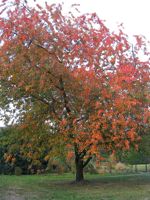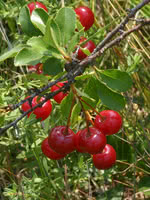Mon-Fri 9am - 5pm Mountain time
Black Cherry vs Cutie Pie Sour Cherry
Prunus serotina
Prunus cerasus Cutie Pie
NOT AVAILABLE THIS SEASON - MIGHT RETURN
NOT AVAILABLE THIS SEASON - MIGHT RETURN
Black Cherry is common in eastern North America but a rare find elsewhere. This tree is shade tolerant and is often found in old fields, forest openings, and along fencerows.
The fruit is edible and is commonly used to flavor rum and brandy. It is also edible and often eaten fresh or used in wine or jelly. Black Cherry trees typically begin producing fruit when they are 10 years of age.
Black Cherry wood is a rich reddish-brown color and is strong, making it valued in cabinetry and woodworking. It is often used in reclamation as well.
The leaves can poison livestock as they contain cyanide derivatives and precursors. However, many have noted that deer still seem to browse their trees with impunity and birds and other animals eat the fruit when available.
The Cutie Pie Sour Cherry produces fruit that are sweeter than other sour cherry varieties. Good for fresh eating and for making jams and jellies. They are small in stature (shrub like) and multi stemmed, which makes for a good hedge.
They are cold hardy and are a hybrid of Mongolian and European sour cherries, produced by the University of Saskatchewan.
They have small, attractive, white flowers. Cutie Pie Sour Cherry trees are self pollinating and require moist, well-drained soil. For better yields, plant compatible cultivars such as the Romeo Cherry nearby.
Black Cherry Quick Facts
Cutie Pie Sour Cherry Quick Facts
Toxicity: bark and wilted leaves toxic to livestock

